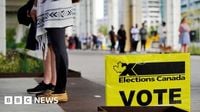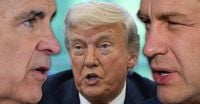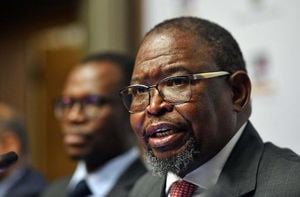As millions of Canadians head to the polls in a snap federal election on April 28, 2025, the political landscape has been dramatically reshaped by the looming presence of U.S. President Donald Trump. Prime Minister Mark Carney, who took office just last month after Justin Trudeau’s resignation, finds himself at the center of a campaign where foreign policy has become a pivotal issue for the first time in decades.
Carney, the leader of the Liberal Party, has accused Trump of jeopardizing the long-standing close relationship between Canada and the United States. "We are in a crisis. President Trump is threatening Canada, he's threatening our companies, he's threatening our workers, he's threatening the savings of our retirees," Carney stated on Tuesday. He characterized Trump’s threats as not merely economic but as an "existential threat" to Canada.
In contrast, Conservative Party leader Pierre Poilievre, who was once seen as the frontrunner for the prime ministership, has opted for a more subdued response to Trump’s aggressive rhetoric. Alberta Premier Danielle Smith, an ally of Poilievre, remarked that he would be "very much in sync" with the new direction in America. This alignment has led to speculation about how Trump’s actions might influence Canadian voters and the upcoming election.
Chiming in on the matter, former Quebec Premier Jean Charest advised Trump to reconsider his approach. "At what point are the Trump folks going to think this thing through and measure what are the consequences?" he questioned, emphasizing the need for the U.S. administration to understand its global impact.
The stakes are high as both Carney and Poilievre have promised to accelerate negotiations over the Canada-U.S. free trade agreement if they win the election. Carney has plans to diversify Canada’s exports, a move that is particularly crucial given that nearly 80% of the country’s exports are directed towards the U.S. He is also reviewing the remaining purchase order of F-35 fighter jets from the U.S., considering alternative options in light of the shifting political climate.
Polls leading up to the election have shown a significant turnaround for the Liberals. In a mid-January 2025 poll by Nanos, the Liberals were trailing the Conservatives by a staggering 47% to 20%. However, the latest poll, conducted just before the election, revealed that the Liberals now lead by 4 percentage points nationally and by 6 points in Ontario, which is home to a significant number of parliamentary seats.
The political dynamics were further complicated when Carney called for the election in March, shortly after assuming the premiership. When Parliament was dissolved, the Liberals held 152 seats compared to the Conservatives' 120, with other parties like the Bloc Québécois and the New Democratic Party holding 33 and 24 seats respectively.
As Canadians prepare to cast their votes, early voting has seen record turnout, with more than seven million ballots already submitted. Polls opened at 7:00 EDT on April 28, and preliminary results are expected to emerge late that night or early the following morning.
Key battlegrounds include Ontario and Quebec, which collectively account for 200 of the 343 seats in Parliament. Carney is running in Nepean, while Poilievre aims to retain his seat in Carleton. The outcome of this election could significantly alter the political landscape, not only in Canada but also in its relationship with the United States.
In the event that no party secures a majority, the leader of the party with the most seats will typically form a government, often requiring cooperation with other parties to pass legislation. If Carney wins, he will not need to be sworn in again, but if Poilievre is victorious, he could take up to two weeks to officially assume the role of prime minister.
As the election unfolds, the implications of Trump’s policies and rhetoric loom large over the candidates’ campaigns. With both Carney and Poilievre pledging to renegotiate trade agreements and respond to U.S. tariffs, the results of this election will not only shape Canada’s future but could also redefine its place in the international arena.
If the Conservatives or Liberals achieve significant wins in the eastern provinces, it could lead to an early election call. However, the intricate nature of the vote counting process means that Canadians will have to wait for confirmation of the results, which are crucial for understanding the future direction of the country.
With the election now upon them, Canadians are faced with a choice that could redefine their relationship with their southern neighbor and impact the economic landscape for years to come. How this election will unfold remains to be seen, but the stakes have never been higher.





